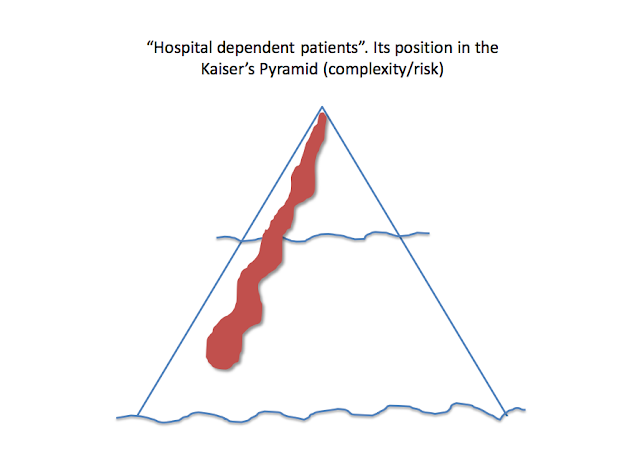In an article published in the New England Journal of Medicine, "Goal Oriented Patient Care," Dr. David Reuben, a geriatric doctor of Ronald Reagan UCLA Medical Center, proposed cataloguing the concept of "hospital dependent patient" such as those patients who a generation before were doomed to die quickly but now, thanks to the combined effectiveness of well coordinated professional teams and availability of technology, their life can be saved but they are unable to return to the previous clinical situation and therefore they enter a state of hospital dependence caused by the same clinical performance that saved their lives. Essentially, we’re not talking about a new disease entity, since most of these patients coincide with the group of chronic complex and/or frail elderly patients.
According to Dr. Reuben, "hospital dependent patients" once hospitalized, can get temporary stabilization, and even an acceptable quality of life, provided they have intensive nurse care, specialists guard teams and adequate resources availability and technological monitoring.
How to spot a "hospital dependent patient"?
Hospital dependent patients’ clinical problems are labile, unstable and unmanageable in the community and, for this reason, their hospitalizations are not avoidable, and herein lies the interest of Dr. Reuben’s cataloguing work.
In contrast, clinical targets for "standard complex chronic patients" focus on community services. These are patients that, if the system is able to offer intense enough programs tailored to their needs, in theory, could avoid hospital readmissions which should be understood as system failures.
What position would "hospital dependent patients" occupy in Kaiser’s Pyramid?
If we focus on the top of the pyramid of patients’ cataloguing, grouped according to the clinical complexity and the risk of death, the pyramid known as Kaiser’s, we notice that the group of patients with multiple diseases and complex health issues and social needs could be representing 5% of the population containing within a subgroup with high complexity, limited life prognosis and need for palliative care, which according to various estimates would constitute about 1.5% of the population.
In this pyramid the group of "hospital dependent patients", represented by the area in red, encompasses a range of patients with complex and varied prognosis, but that would be characterised, as defined by Dr. Reuben, in urgent need of hospital care to achieve clinical stability.
What to do with the “hospital dependent patients"?
If you want to streamline the attention given to "hospital dependent patients", the first step is to ensure that the intensity of treatment is appropriate to their values and preferences, making it necessary for doctors to talk as much as they can with the patients and their families to properly interpret what is the aim of each of the clinical actions that are intended to be undertaken.
Health systems need to recognize that their activities are creating a group of incurable, but not yet terminal patients, for whom community or socio alternatives are not effective, they need to receive at least as many resources that a hospital would receive.
From my point of view, there are three things to do with the "hospital dependent patients": a) cataloguing them in order to differentiate them from standard complex chronic patients, b) be honest (and realistic) with them about their prognosis and objective decisions, and c) evaluate the effectiveness of an intensive long term program that avoids hospitalizations, thinking more about the adequacy than on savings.
Jordi Varela
Editor
Jordi Varela
Editor






Everything thought of you as, endeavor to discuss the information and estimation of the workmanship preparing. Craftsmanship preparing is a heavenly thing and http://www.personalstatementwriters.com/mcgill-university-admissions/ site should take in this guidance with the best way.
ReplyDeleteEvery sort of facilities you have given to the patient will depened outcome. http://www.medicalpersonalstatement.org/about-medical-school-personal-statement-consultants/ is really important for the personal statement writings service.
ReplyDeletePatients are really depended to the hospital and this is why they need better service. These additional info
ReplyDeletewill help you on the optometry school factors you wanted to know.
The number is increasing because of the burden of the work and we are under pressure so that is helpful link
ReplyDeleteat this time for the patients to have help from.
The number is increasing with the help of website as there are chances that they might not be able to gain the right place in the right time.
ReplyDeleteI think this is an informative post and it is very useful and knowledgeable. therefore, I would like to thank you for the efforts you have made in writing this article. Get the home care provider at Northfield Senior Center.
ReplyDelete